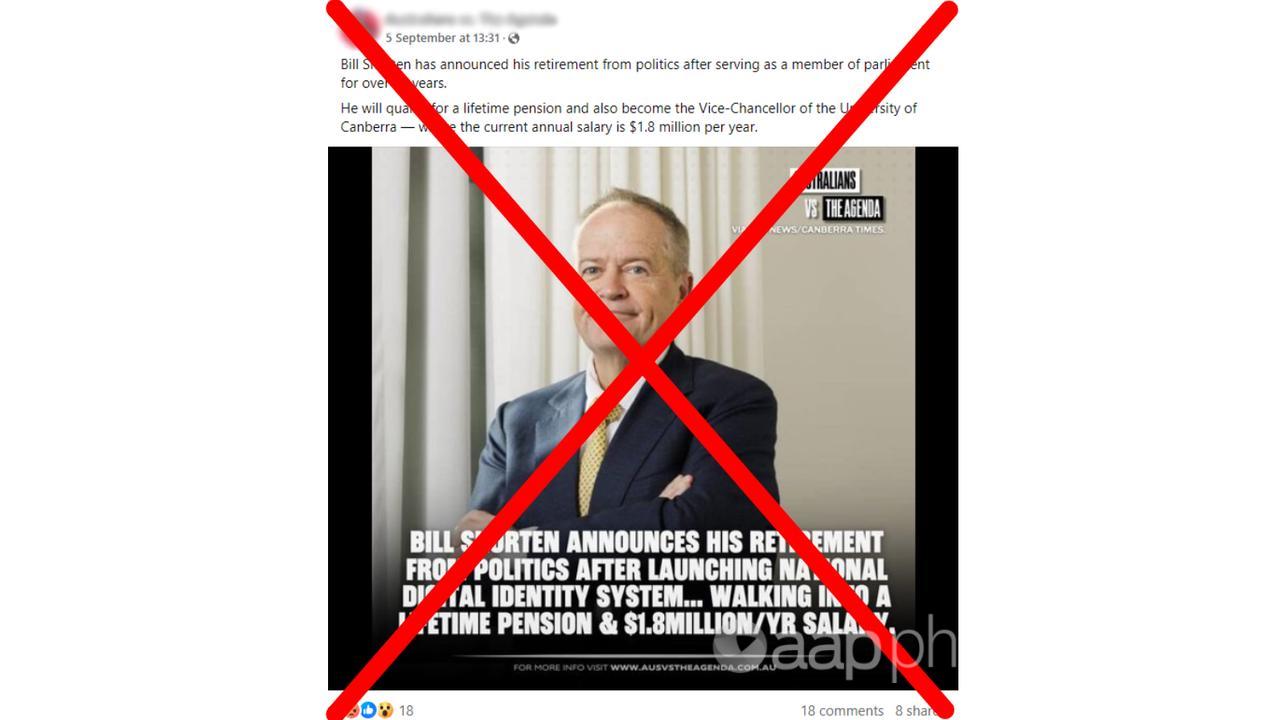AAP FACTCHECK – The news that Bill Shorten is retiring from politics has sparked multiple claims the former opposition leader will leave parliament with a lifelong taxpayer-funded parliamentary pension.
This is false. Parliament’s previous defined benefit pension scheme was closed to new MPs in 2004. Mr Shorten was first elected in 2007, so is not eligible for the scheme.
MPs elected from the 2004 election onward are instead enrolled in a regular superannuation fund with an employer contribution of 15.4 per cent of their salary.
A defined benefit pension fund provides a retiree with annual payouts ‘defined’ by how long they worked for their employer and their salary level at the time of retirement.

Superannuation is an ‘accumulation’ fund that increases over time depending on the amount of money put into the fund by the employer and the employee, as well as the performance of the fund’s investments.
Superannuation is not necessarily a “lifetime pension” because it can run out if you live long enough to withdraw the full value of the fund.
Numerous social media users made the claim in the hours after Mr Shorten announced on September 5 that he would leave politics to become the vice-chancellor of the University of Canberra in early 2025.
Some social media posts claimed Mr Shorten qualified for a lifetime pension, while others wrongly calculated he would get $200,000 or even $290,000 each year.
The parliamentary contributory pension scheme in operation before 2004 provided eligible retiring MPs with lifelong payouts, sometimes in excess of $200,000 per year.
Graeme Orr, a professor of politics and law at the University of Queensland, previously told AAP FactCheck the old pension scheme was closed off for new MPs after Labor’s then-opposition leader Mark Latham made it a political issue in early 2004.
As a result, John Howard’s coalition government was pressured into introducing a less generous scheme for new MPs but retained a clause to protect existing MPs’ benefits, known as a grandfathering clause, Professor Orr said.
The replacement superannuation contribution scheme operates in line with regular Australian superannuation rules.

The Commonwealth pays 15.4 per cent of an MP’s salary into their superannuation fund, which MPs can top up with additional contributions.
Superannuation rules are the same for all Australians, regardless of their job. All superannuation holders can begin accessing their fund at between 55 and 60 years of age, known as the “preservation age“, depending on their date of birth.
The Commonwealth Department of Finance previously confirmed to AAP FactCheck that federal parliamentarians first elected on or after 9 October 2004 are not entitled to a pension from the parliamentary contributory superannuation scheme.
The Verdict
False – The claim is inaccurate.
AAP FactCheck is an accredited member of the International Fact-Checking Network. To keep up with our latest fact checks, follow us on Facebook, Twitter and Instagram.
All information, text and images included on the AAP Websites is for personal use only and may not be re-written, copied, re-sold or re-distributed, framed, linked, shared onto social media or otherwise used whether for compensation of any kind or not, unless you have the prior written permission of AAP. For more information, please refer to our standard terms and conditions.


















